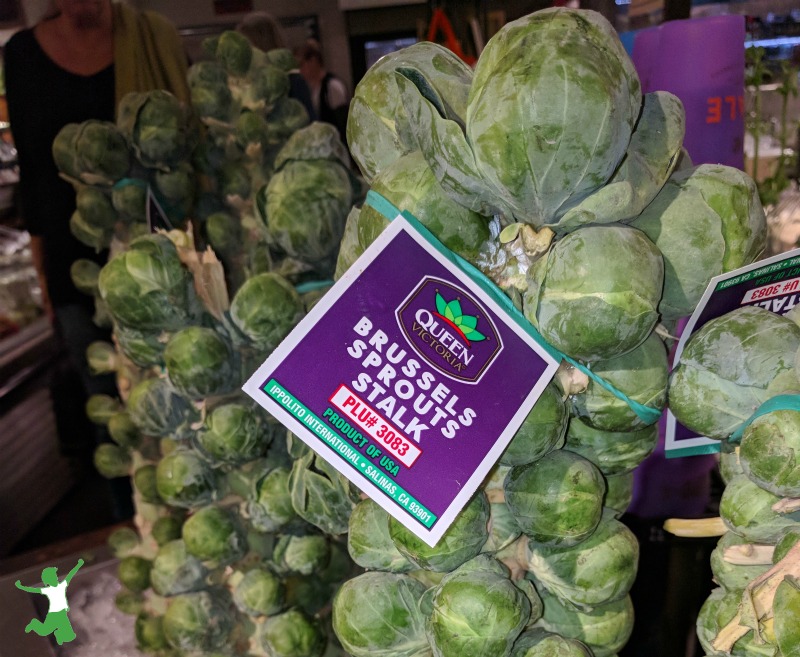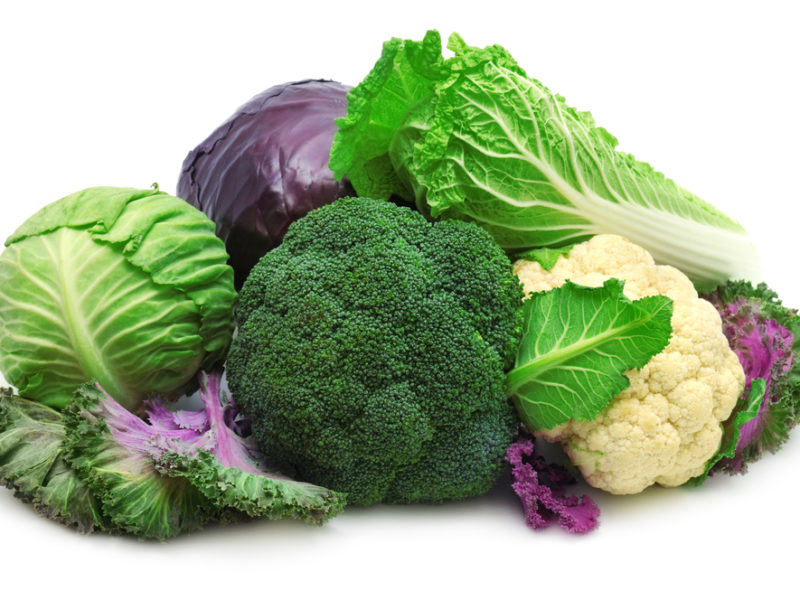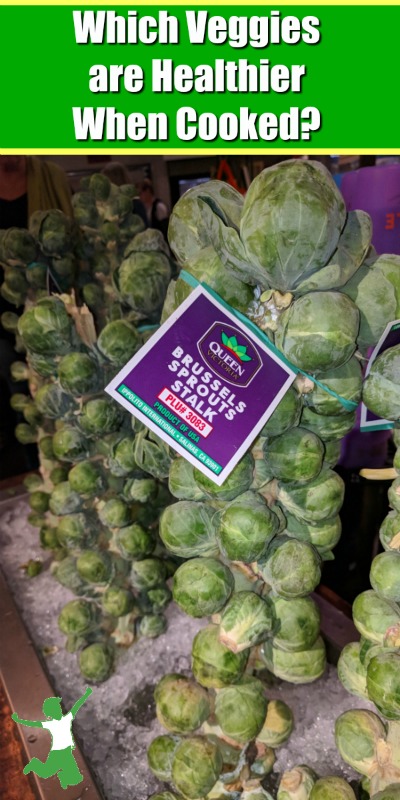Table of Contents[Hide][Show]
Conventional belief is that raw vegetables are always healthier than cooked, but this is not true depending on the plant foods eaten according to lab testing and anthropological evidence by experts in the field.
I stopped by one of my favorite healthfood stores today to pick up a large glass of fresh juice made from organic raw vegetables for an early lunch on the go. As usual, I asked for the a carrot, celery, beet, spinach and cucumber blend. But, hold the spinach. I definitely skipped the green smoothie too!
While this request is usually met with a simple nod by the juice bar attendant, this time the guy looks up and says, “Why no spinach? We have a lot of people that come in here and love the spinach in their juice.”
Ah! Great question!
The truth is that not everything should be eaten raw, especially vegetables!
Some raw vegetables must be cooked else you are actually harming yourself. Below is a rundown of what veggies should not be eaten raw either in whole or juiced form.
Cruciferous Raw Vegetables

Sorry to be the bearer of bad news, but cruciferous vegetables should be cooked before eating as they contain chemicals that BLOCK the production of thyroid hormone in your body! Considering that 2 out of every 3 Westerners are either overweight or obese and this is projected to jump to 75% by 2020, this is of particular importance as folks struggling with weight usually suffer from borderline to full-blown hypothyroidism.
Hypothyroidism is a condition where the thyroid gland does not make enough thyroid hormone, so someone suffering from this condition surely does not want to be eating foods that will block what little thyroid hormone is being produced in the first place!
Symptoms of hypothyroidism include cold hands and feet, thinning hair, fatigue, reduced or nonexistent libido, coarse dry hair, constipation, difficulty losing weight, and depression among many others.
Cooking crucifers reduces the goitrogenic substances by about 2/3. Fermentation does not reduce goitrogens in these veggies, but since fermented crucifers such as sauerkraut are typically eaten as a condiment and, hence, in small amounts, consumption is fine if the diet is rich in iodine.
Here is the list of common cruciferous vegetables that you do not want to be eating raw if you want to protect your thyroid gland!
Arugula, broccoli, kale, maca root, cauliflower, cabbage, turnip, collard greens, bok choy, brussels sprouts, radish, rutabaga, and watercress.
Notice that many of these vegetables are commonly included in fresh veggie juice blends or in salads. While an occasional arugula salad or cup of coleslaw is not going to do harm to most folks, it would be wise not to make a habit of eating/drinking any of these vegetables in raw form. Kale chips are a safe choice too.
Raw Vegetable Greens
Some veggie greens contain a chemical called oxalic acid. This substance is a very irritating to the mouth and intestinal tract. It also blocks iron and calcium absorption and may contribute to the formation of kidney stones.
The good news is that oxalic acid is reduced by a light steaming or cooking. Just be sure to discard the vegetable cooking water.
Veggies containing oxalic acid include spinach, chard, parsley, chives, purslane and beet greens.
Hmmmm. Spinach is known for being high in iron, yet eating it raw will not necessarily give you the iron you want because of the oxalic acid?
Yep, that’s right. Cook that spinach first if you are seeking an iron boost without the indigestion and don’t get hooked on the raw spinach salads!
Don’t stress about munching the parsley garnish on your next gourmet dinner, though. A little bit here and there is not going to cause a problem. Eat a big spinach salad everyday and it is virtually certain you will eventually succumb to kidney stones, according to Dr. William Shaw, Director of The Great Plains Laboratory for Health, Nutrition and Metabolism.
Other Raw Vegetable Cautions
Other vegetables that are best to avoid eating raw include:
- Raw potatoes contain hemagglutinins that disrupt red blood cell function.
- Raw sweet potatoes will give you gas.
- Raw, edible mushrooms such as the common white mushroom contain toxic substances such as agaritine, a suspected carcinogen. These substances are heat sensitive and are neutralized by cooking.
- Raw alfalfa sprouts are mildly toxic and inhibit the immune system. Eating large quantities regularly can make the skin overly sensitive to the sun or trigger autoimmune symptoms that mimic lupus.

Dr. Weston A. Price on Raw Vegetables
A good rule of thumb when considering the best way to consume your veggies is to remember the letter that Dr. Weston A. Price wrote to his nieces and nephews in 1934. In this letter, he strongly urged them to eat their vegetables cooked in butter. His research found that the bulkiness (fiber) of raw vegetables interfered with the human body’s ability to extract minerals from them via the digestive process.
So, should you drink your veggies raw? Of course. Raw vegetable juice made from veggies that are safe to consume uncooked is a wonderful way to get a fast infusion of easy to digest, colloidal minerals. It is also highly alkalizing to the body and a proven way to gently detox the gut.
The great thing about veggie juice is that the fiber is removed, which is the “bulkiness” that Dr. Price found interfered with the mineral absorption.
However, if you are going to eat the fibrous portion of the vegetable, it is best to cook them in butter as advised by Dr. Price to enhance the availability of the minerals. The fat in the butter permits greater absorption of the minerals, and besides, buttered veggies taste fantastic!
References
Nourishing Traditions
The Role of Oxalates in Chronic Disease, William Shaw PhD (Director of The Great Plains Laboratory for Health, Nutrition and Metabolism)
More Information
Best Green Juice for Congestion
Nightshade Vegetable Contraindications
Cleansing Myths







Thank you for all of your very thought provoking posts! I have been doing the Body Ecology Diet for about 3 months now…So I am, of course, eating A LOT of cultured veggies (mostly napa cabbage, daikon, broccoli, carrots, celery, onion, etc) so this worries me a little. The cultured veggies are helping me lots (and I REALLY enjoy them!) I probably eat at least 1 cup per day. Do you think I’m safe if I try to eat more sea vegetables? I also try to make and consume coconut kefir as often as possible. Also, I’d love to hear any other thoughts you may have on elements of the Body Ecology Diet where I may need to take caution. I use a ton of ghee in my cooking as well…Thoughts on ghee?
Thank you!!
Thanks for the advice, I will for sure cut down on them 🙂
Awesome. It is better to be safe than sorry and there are so many wonderful veggies to eat raw that are safe so why take an unnecessary risk with such a delicate gland as the thyroid. It is butterfly shaped for a reason I think! 🙂 Think of a butterfly .. you only have to touch it’s wings slightly to damage and kill it. I think the thyroid gland is the same. So very delicate and needs to be protected vigilantly.
I found this u-tube video that explains that it is safe to eat cruciferous vegetables raw, as long as you don’t have a thyroid problem and as long as you are getting adequate amounts of iodine in your diet. Sarah – can you watch this video and see if this information is good. I think it is, but I can always use another opinion.
http://www.youtube.com/watch?v=k5o2kICC4Tg&feature=player_embedded
Small amounts occasionally is ok, but it is not safe to eat them every day in the quantities folks are consuming them in green smoothies etc. Chris Masterjohn says the eating goitrogenic veggies fermented (such as sauerkraut is ok in small amounts as long as there is enough iodine in the diet and not a thyroid problem.
HOWEVER, given that upwards of 80% of Westerners are hypothyroid to some degree, it is not wise to eat cruciferous veggies raw. I only eat them in very small amounts as fermented condiments. Its just not worth the risk!! Why not cook them in butter? Once you have thyroid problems it is so very difficult to undo .. it is foolish to roll the dice with this one and “assume” you don’t have a thyroid problem when most everyone does to some degree.
Thanks for the article. Too many people cling to the assumption that raw vegetables are the healthiest way to to eat them. As for eating them cooked, wouldn’t the Weston Price people recommend using unpasteurized butter from pasture-fed cows?
Josh Zimmer, AP – Sarasota
Hi Josh, absolutely – grassfed raw butter is best. Unfortunately, some are unable to afford this luxury in which case store butter is an acceptable option.
Any idea about Cilantro, does that have a high oxalic acid amount. Would it be safe to use in green smoothies on a daily basis ?
Cilantro is best fermented, although a bit of raw cilantro is fine. In smoothies daily? I don’t think so. There is a GREAT recipe for fermented cilantro salsa on this blog, by the way (guest post from Stanley of TenderGrassfedMeat.com)
https://www.thehealthyhomeeconomist.com/fermented-cilantro-salsa-for-chelation/
Very interesting…have been reading/hearing a lot about green smoothies lately. I think the key to everything is to eat it in moderation. Nothing is going to be the be all and end all or miracle cure, etc. So, as long as we are eating a good variety (of healthy foods of course) we should be fine. I think when we start picking everything apart constantly it's hard to enjoy food because we're worried about it being bad for us. I really have to work on not being obsessed with the kinds of foods I eat as I'm a huge health nut. But to keep sanity in my house (aka not drive my husband crazy)I try to offer a good varied diet, not getting caught up in any one "superfood" of the moment. So, I'm really glad to have read this article to keep me from jumping on the green smoothie bandwagon because I know that would not go over well in my house. 🙂
Oh, I understand, Sarah, thanks !
Kate, the only difference with walnuts is to make sure you store them in the fridge as they will easily go rancid in the pantry. They are more delicate than other nuts.
thanks, Sarah, I bought Sally Fallon's book a couple of weeks ago and I am so happy about it ; it's the information I was hoping to find for years, and your blog gives the strengh to keep on ; I live with mcs, hope it will help. Really appreciate all the details you give me for walnuts ; I always heard about soaking other nuts but never walnuts.
Regards
Hi Kate, yes raw nuts should be soaked in filtered water with a bit of sea salt overnight and then dried in a warm (not hot) oven to preserve rawness. Raw nuts that are not soaked cannot be easily digested due to the copious anti-nutrients in the nuts themselves. Many folks who have trouble with nuts find they can eat them easily once they are properly prepared.
They aren’t “anti-nutrients”, they are enzyme inhibitors. Geesh. And you soak nuts to get rid of them.